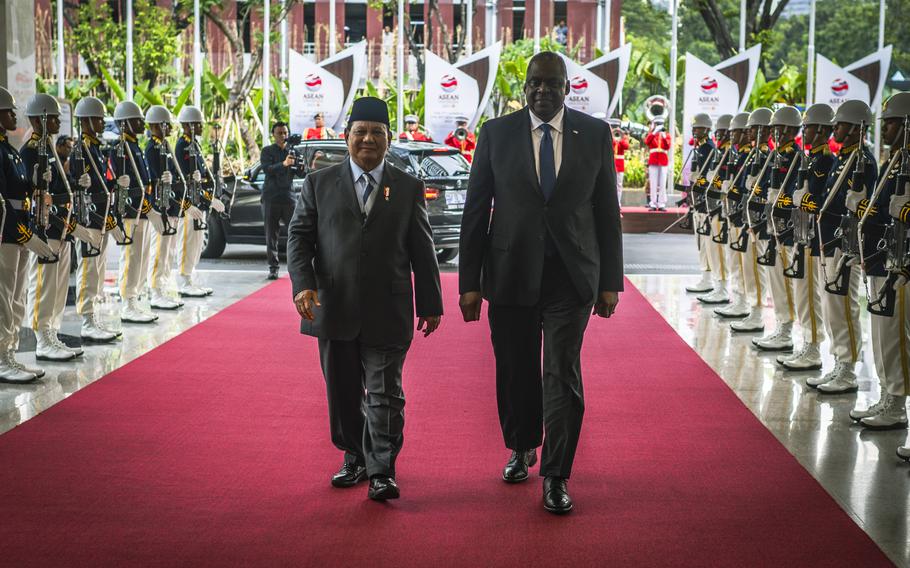
Indonesian Minister of Defense Prabowo Subianto and U.S. Defense Secretary Lloyd Austin arrive at the 10th ASEAN Defense Ministers’ Meeting in Jakarta, Indonesia, Nov. 15, 2023. Subianto, a figure long at the forefront of Indonesian politics, appears prepared to ascend to the presidency, having secured a majority of the votes in Indonesia’s recent election. (Chad J. McNeeley/Department of Defense)
In the sprawling archipelago of Indonesia, a nation cradling a mosaic of more than 17,000 islands, a pivotal moment has arrived. Prabowo Subianto, a figure long at the forefront of Indonesian politics, appears prepared to ascend to the presidency, having secured a majority of the votes in Indonesia’s recent election. The victory is not simply a personal achievement for the outgoing defense minister; it serves as a beacon of Indonesia’s democratic resilience and marks an opportunity for transformative leadership of a nation at a crossroads.
The electoral process, a testament to the robustness of democracy in the world’s largest Muslim-majority country, has been both a marathon and a sprint. Over the past several months, Prabowo — the obvious heir to the immensely popular Joko Widodo — has traveled across Indonesia, visiting cities and villages to meet with individuals of all faiths, ethnicities and backgrounds — young and old, students and teachers, parents, professionals, soldiers, farmers, businesspersons and traders.
With almost 60% of the vote in, exit polls and sample counts point to a commanding lead for the presidential aspirant. To be clear, the official tally will require weeks — a period of anticipation that underscores the meticulousness of democratic procedure. What is certain is that, as of now, Prabowo is the indisputable victor, and he appears to have a demonstrable mandate from the Indonesian people.
An 83.5% voter turnout in the elections is a figure that resonates beyond mere statistics; it embodies the vibrant political engagement of the Indonesian electorate. By comparison, the 2020 U.S. presidential campaign saw American voter turnout levels soar to 62% of the voting-age population — a level not seen in decades.
Indeed, Indonesia’s electoral participation is a victory in and of itself and demonstrates a collective commitment to shaping the Southeast Asian nation’s trajectory. That the elections occurred without unrest also punctuates the democratic foundations upon which Indonesia stands.
Of equal importance is the mandate granted to Prabowo. Many interpret it as a clarion call for progress and an endorsement of his vision for Indonesia’s future. It is a future envisaged to be built on the pillars of national sovereignty, security and prosperity. Prabowo’s campaign has been characterized by a medley of engagements and interactions across the diverse nation. From the urban sprawl of Jakarta to the rice terraces of Bali, from the bustling markets of Surabaya to the beaches of Sulawesi, the presidential hopeful has presented a collective vision for Indonesia.
The election is perhaps the most consequential since the country first embraced democracy. Prabowo’s victory heralds a new chapter in Indonesia’s storied history, an opportunity to accelerate the ambitious reforms initiated over the past decade. Improvements aimed at modernizing the armed forces, bolstering economic justice, and ensuring national self-sufficiency are poised for a leap forward under the country’s new leader.
As he stated in a speech on the eve of his election, “We should not be arrogant. We should not be proud. This victory must be a victory for all Indonesian people.”
Indonesia under Prabowo’s watchful eye is equipped to become a nation that is self-sufficient in energy, food and water; a society where millions are uplifted from poverty; and a democracy that is more open, vibrant and inclusive.
With Indonesia on the brink of this new era, the expectations of the incoming president are immense. But the collective will of the Indonesian people provides a strong foundation for the journey forward. Together, with a vision of unity and progress, Indonesia is capable of navigating the challenges and opportunities of the 21st century, forging a path that not only defines its future but advances global democracy.
Nevertheless, reservations remain from some quarters.
Some prominent scholars and their human rights counterparts remain troubled by Indonesia’s checkered human rights past, namely the transition to the New Order some 60 years ago and the violent purges that ensued.
Even as these individuals acknowledge the “good ideas” outlined in the Comprehensive Strategic Partnership released by the White House last fall, some remain justifiably skeptical of a Prabowo presidency.
Will he return to his sometimes-illiberal past, they wonder, or live up to his more recent pledges to pluralism and democracy?
Prabowo will need to overcome this disbelief and remain committed to protecting the rights of indigenous people, the land and the environment. He will also need to tolerate dissent from human rights activists should they elevate their concerns during his tenure.
But there is reason for American officials to be optimistic.
Prabowo’s victory constitutes an opportunity to deepen bilateral ties, advance the nascent U.S.-Indonesia strategic plan, overcome motivational distrust, and build an historic new era marked by Indonesia’s respect for democracy and pluralism and measures that advance joint security interests in the Indo-Pacific.
As one of my colleagues put it to me recently, “Indonesians love America … our media, culture, even our accents! But those who are informed are wary of our foreign policy.”
Strengthening bilateral relations will take time, and it will require the suspension of cynicism.
In this moment of transition and hope, Indonesia reminds the world of the power of democratic choice and the potential for transformative leadership. Prabowo’s presidency will be a test, a challenge, and an opportunity to lead Indonesia into the future.
Ivan Sascha Sheehan is the associate dean of the College of Public Affairs and past executive director of the School of Public and International Affairs at the University of Baltimore. Opinions expressed are his own.